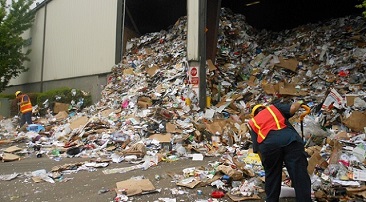JERSEY CITY, N.J.—In about a year and a half, Pace Glass Inc. will open the world’s largest glass recycling facility in Andover, N.J. The 250,000 square foot plant will join the company’s Jersey City, N.J. facility and give the Northeast and beyond a means to recycle 800,000 tons of glass annually. George Valiotis, CEO of Pace Glass, says between 6 million and 7 million tons of glass were recycled in the United States last year.
“Hotels have a unique opportunity to play an important part of this recycling infrastructure,” Valiotis says. “They have a lot of waste they could divert.”
 Less than 30 percent of glass is now recycled in the United States. Valiotis says there is currently not a good infrastructure for it. Getting at the glass that is mixed in with metals, paper and other materials is one of the challenges. Pace’s recycling process utilizes optical scanner technology that takes 1,000 pictures per second to sort glass by color before separating and depositing it via jets of air into three designated containers on a conveyor belt. The glass products are then converted to cullet, which can either be transported to neighboring manufacturing facilities or placed into onsite melting furnaces. The residual dust can be sold as filler for a variety of different products.
Less than 30 percent of glass is now recycled in the United States. Valiotis says there is currently not a good infrastructure for it. Getting at the glass that is mixed in with metals, paper and other materials is one of the challenges. Pace’s recycling process utilizes optical scanner technology that takes 1,000 pictures per second to sort glass by color before separating and depositing it via jets of air into three designated containers on a conveyor belt. The glass products are then converted to cullet, which can either be transported to neighboring manufacturing facilities or placed into onsite melting furnaces. The residual dust can be sold as filler for a variety of different products.
“Most of what we recycle ends up in new bottles,” Valiotis says. It takes more energy to make new bottles as compared to ones from recycled glass. The larger pieces of broken glass go back to the container industry and get made into those bottles. “We grind down the smaller particles into a dust-like material and sell it to companies that make fiberglass,” Valiotis says. Recycled glass can also end up in other industries—to be made into windshields or even as an additive in paint thinner.
By removing glass from the waste stream, it becomes more scalable for waste to energy facilities.
Impact of China’s Actions
When China stopped taking recyclables, it created “a lot of headwinds for the recycling industry,” Valiotis says. “Existing landfills now have to accept mixed paper and plastic…it affects the available room for other materials. Landfills that used to have a 10-year capacity, the time has been cut in half, they now have a five-year capacity.”
The more landfills reach their capacity, the more methane they produce and the more pollution they create. “Even those sealed and covered are polluting,” Valiotis says.
Fortunately for companies like Pace Glass, the glass market was not impacted as much by China’s decision because it has almost always been domestic.
Many New Jobs Will be Created
In the United States currently, bottles are made from 30 percent to 40 percent recycled glass. Valiotis is hoping his company can help get that percentage closer to 60 percent to 70 percent in the next 10 years. He is also hoping his company’s waste sorting technology will become an industry standard, removing a huge chunk of the waste bound for the landfill.
The coming of the new Pace Glass plant is good news for the overall recycling industry which has seen a recent decrease of 30 percent.
Pace Glass will be creating approximately 80 local jobs in two daily shifts—nearly double the number that are now employed at the Jersey City location—in addition, as many as 60 truck drivers will be hired to deliver the recycled glass to manufacturers in the Tri-State area, upstate New York, Massachusetts and Pennsylvania. The new plant will also enable Pace Glass to more than triple its production capacity to more than 15,000 tons of commercial-grade recyclable glass per week and 90 tons an hour. Currently, the company processes 25 tons per hour.
Glenn Hasek can be reached at greenlodgingnews@gmail.com.






